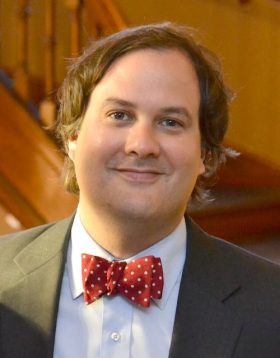In recently published scholarship in the Cardozo Arts & Entertainment Law Journal, as well is in presentations at law schools nationally, Elon Law Professor Enrique Armijo has advanced proposals to strengthen free speech protections for those communicating online through government-provided Internet access.

Armijo’s introduction to the article follows:
“Governments play a growing role in providing access to digital speech spaces. This development has important consequences for free expression. Communication’s migration from physical public spaces to virtual ones has increased the State’s capacity for ex ante interference with speech, from targeted blocking of users, websites, and applications on its communications networks to shutting off access to those networks altogether. Contrary to the conclusions of most Speech Clause scholars, the First Amendment’s public forum doctrine is ill equipped to solve these problems, in part because the doctrine under-protects speech that is not expressed in shared physical space. Accordingly, this Article proposes a different path for applying the First Amendment to State-provided speech spaces: When a government transmits user speech over its networks, it should give that speech common carrier–type treatment, and both use-based and user-based discrimination over those networks should be presumptively barred. In addition, established doctrines such as prior restraint, incitement, and content neutrality can resolve any questions concerning digital speech in virtual public space.”
Previously, Armijo presented scholarship in this area at Stanford University and Santa Clara University School of Law. In addition, Armijo presented on First Amendment matters arising in the context of public Internet service at the February 27-28 “Smart Law for Smart Cities: Regulation, Technology and the Future of Cities” symposium at Fordham University School of Law. Armijo presented a paper entitled “Government-Provided Internet Access: Terms of Service as Speech Rules,” discussing First Amendment issues raised by municipalities’ provision of free public high-speed Internet service to city residents. Armijo’s paper was also quoted in an article published by NextCity.org.
Contributing to regional discourse in law and national policy, Armijo participated in the “GTMO After 9/11: Detainees, Defense and Legal Exception” discussion, part of the “Voices from Guantanamo” series at the International Civil Rights Center and Museum in Greensboro, N.C., on January 31, where he and other panelists discussed national security and human rights in the operation of the detention center, why Guantanamo came to be used as a detention center and possible future plans for the site.
Armijo has provided advice on media and Internet law reform to governments, stakeholders and NGOs located around the world, including in Africa, Asia and the Middle East. Most recently, he has worked on media and communications reform projects in Myanmar (Burma) for the U.S. Department of State.
Learn more about Elon Law Professor Enrique Armijo here.


